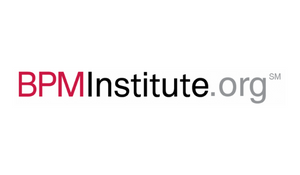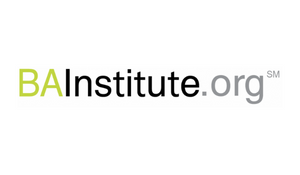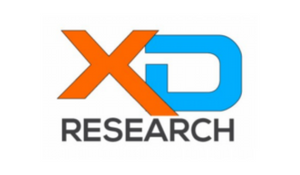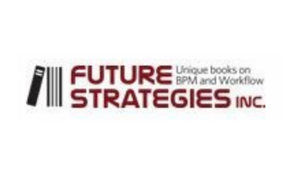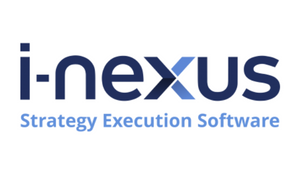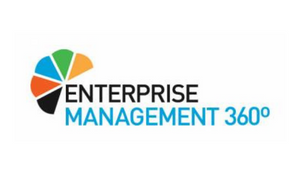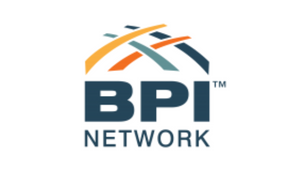

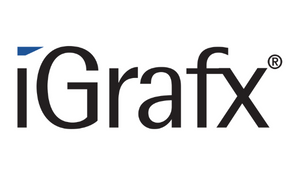

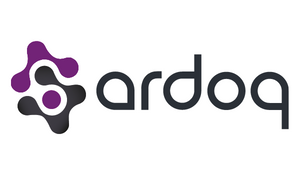
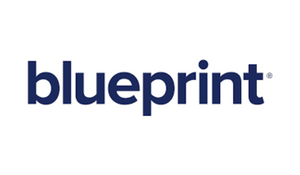
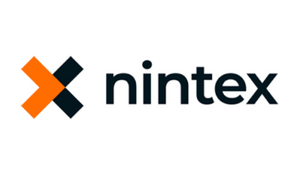
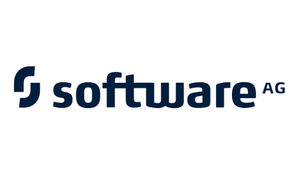

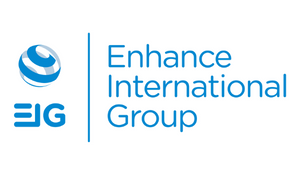
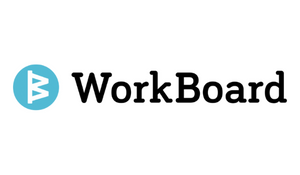
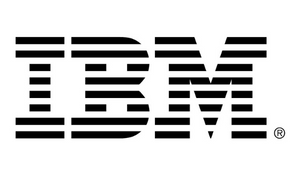


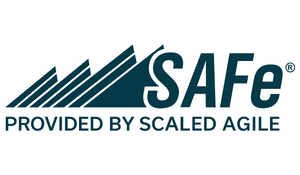

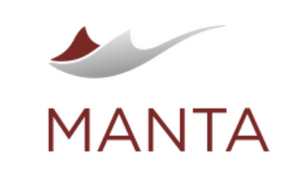



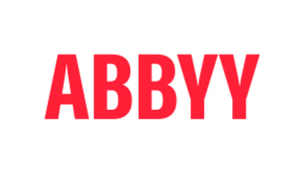

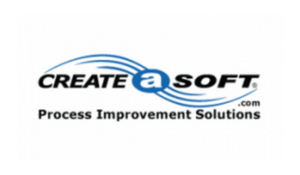




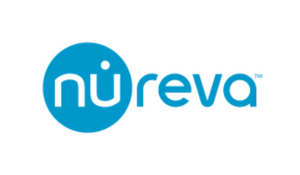
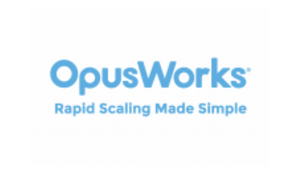
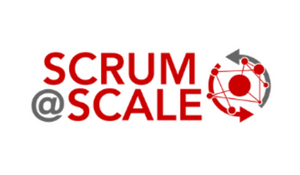

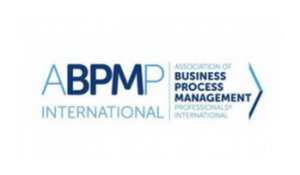
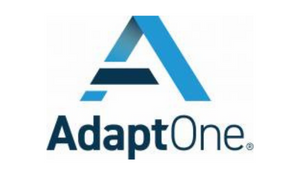
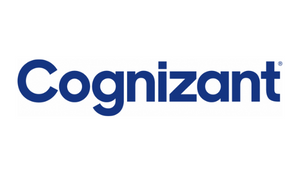
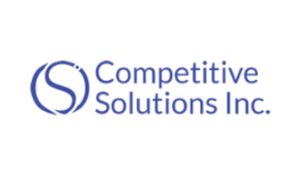
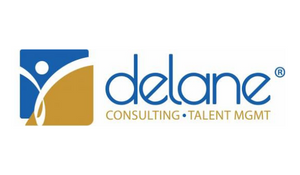

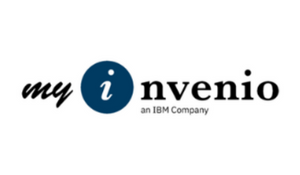

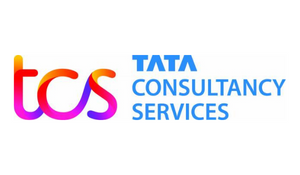
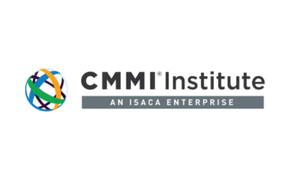
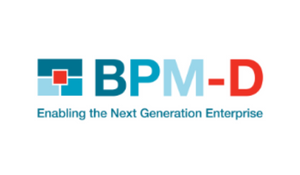

Courtesy of SS&C's Dr. Zeynep Hizir, below is a transcript of his speaking session on 'Digital transformation (DT) is disrupting the way businesses operate and impacts five key areas of any business model' to Build a Thriving Enterprise that took place at RPA & Intelligent Automation Live.


Session Information:
Digital transformation (DT) is disrupting the way businesses operate and impacts five key areas of any business model
Dr. Hizir will provide an overview of digital transformation readiness in banking, financial services and insurance (BFSI) industry with a discussion of key findings resulting from a survey SS&C Technologies conducted in the last quarter of 2020, analysing the progress of DT in BFSI over the first half of 2021.
Session Transcript:
Excited to, to, to invite our first speaker today, coming directly from London. We have doctor ... here with us. She is going to talk about digital transformation is disrupting the way businesses operate, and in fact five key areas of any business model. So I'll do a quick introduction.
Doctor ..., here she is a passionate, driven and ambitions digital transformation scholar, influencer, and commentator specializing in the implementation of Intelligent Automation Solutions, which combines RPA with artificial intelligence, specifically in the areas of financial services.
She has comprehensive investment and asset management, business development and client relationship management experiences across various asset classes and has led teams in London, New York and Istanbul.
Her academic research has focused on RPA implementation and client services of global institutional investment management firms. Doctor is here. It's a real pleasure to have you with us. Thank you for sharing your expertise with our global audience today.
Thank you so much for having me. I watched the presentations yesterday, and they were fantastic, and it's very tough to follow up on our successful day, yesterday, but here we go.
I'm the first one, so I really aim to share at least one information that are and our panelists, our participants, are delegates, have not thought of before. So, hopefully, I'll hit that.
I'm going to now share my screen, and then jump into our presentation.
So I know that in the, these three days, information filled three days, we've had the opportunity to find out about many aspects of RPA, artificial intelligence, and intelligent automation.
I'll be providing you with a high level information on how RPA has impacted the banking, financial services insurance sector and how it continues to be a mature digital transformation tool. I know that some of the information I'll share will be basic, But we have a lot of participants who are watching from different areas of businesses, So some of the Some of the definitions, Maybe, a little bit basic. So the agenda is to go over the landscape and how RPA augmented as organizations that adopted it.
We'll talk about RPA and RPA benefits, naturally leading to the big fear, which is called ..., and I'll touch touch upon that. Obviously, this is a fear that I don't share.
Then we'll move on to addressing these fears by talking about the five P's of Digital Transformation, and that's the model that can be applied to any business model. And, in our digital transformation journey, there are five key elements that need to be addressed.
Then, I'd like to put on some survey questions.
I have some survey questions that I will share answers with you. We will not do the survey today. And this survey was done by ... across 50 large insurance companies in North America last year, and today, due to the technical difficulty, I won't be able to run it this time around, but hopefully another time.
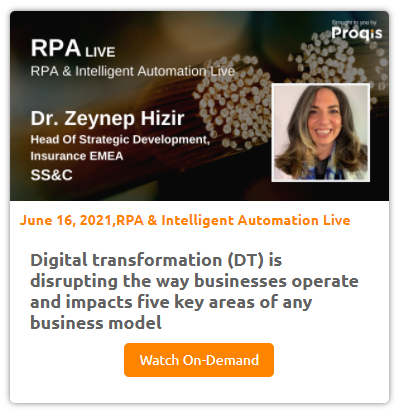 So, here we go, Let's go.
So, here we go, Let's go.
The banking financial services and insurance sector has been under enormous pressures even before the pandemic hit.
The changing climate and a lot of customers that customization demands less scalable, client servicing and margins kept shrinking and regulatory requirements became more and more cumbersome. So, these major pressures, there was a need for companies to find ways to differentiate themselves.
That's really where I've done my research. When I was doing my doctorate, I wanted to find out what is a way that insurance companies, investment management companies can enhance their businesses, reduce their costs. How will they be able to do this? So this is where disruption and technology coming.
I watched actually one of the previous presentations in IBM and he explained very well how disruption does not mean technology itself.
There's sometimes the confusion that when people hear the terminology, disruption, automatically, they think of technology, but that's not how it works.
How business models change with technology, this is what we would refer to as a state of disruption. So, technology is one of the tools of disruption.
So, the pandemic actually accelerated adoption of technologies. So, if we think about Zoom, I'm sure we all know or we may be one of those people who never used WebEx or zoom before the pandemic it. I knew a lot of people who would just use the traditional rich format to join meetings and conversations. But, as we hit the pandemic, this became a necessity and everybody was able to do to do to zoom and jump into a Zoom call and organize these me, these meetings. That was actually resistance to change, even though companies provided the technology for their employees to use the technology. There was a resistance to change. And this was at a smaller scale, when, throughout this presentation, When I talk about resistance to change, please, remember, this example, that, even though we had the ability to use Zoom meetings, it was not widely used, and some people would even refuse to use it.
But anyway, we'll come back to that later on.
I also want to address the continuous improvement timeline, that you see here, on the bottom of the screen.
RPA technology, This disruption, these are not new actors.
That's why artificial intelligence and intelligent automation is also referred to as the fourth industrial revolution. So, here, we take a look at the first industrial revolution where we had the industrial industrialization and factories. We had the industrial age, and then we moved on to the seventies with total quality management, seventies, and eighties. Then, we have ERP and CRM in the nineties, and then BPM BPI in the last two decades, and BPA, and also BPO. So, business process outsourcing. I mentioned this because RPA is very closely linked with business process outsourcing. It's aimed at reducing the manual, repetitive, mundane tasks that are vital for the company, but incredibly boring and manual for the Execute the ones who are executing the tasks.
I know, because I've been in the back middle and front offices of large investment management firms for a long time, and I love to refer to Charlie Chaplin's modern times, where we feel like factory workers and where we just part of a big machines. So, I'm just going to show you a quick video.
What I mean.
Bear with me.
I think we get the picture.
And so I've, I, I wanted to show this, because a lot of times, people do feel like they're part of that machine and working, in, instead of feeling like people, they're feeling like they're machines. So what RPA dust, is, RPA aims at removing the robot out of people, and I really like that. Because that's really how RPA has infiltrated in our, in our world.
 I want to make sure that you are able to see my screen that's perfect.
I want to make sure that you are able to see my screen that's perfect.
So I'll move on to RPA.
So RPA itself is not smart.
I've been studying RPA since about 2015 and 2016.
And as part of my doctoral research, when I first started looking into it, it was the best thing. I think there's a comment. I'm just going to take a look at a comment.
If there's some comment here, please do interrupt me, Because I do see that there's a red bubble coming up. Yeah. No worries, now. I'm capturing those for the Q&A just going for.
Thank you so much.
So RPA I was talking about when I started studying RPA, that was around 2015 and 2016. And then it was the best thing. And I was really happy to have found this topic that I could write a doctorate on and do a research in. And at the same time, it would enhance the way that I do my work, that I would contribute to my business.
But then it was said, no, no, RPA is not the best thing. It's only a band-aid solution. It really doesn't work. And a lot of companies who were early adopters of RPA, there were disappointed that they were not seeing their expected return on investments. And that was a bit of a disappointing moment in the RPA timeline.
And then it IPA with was hooked up with artificial intelligence and then we call this intelligent automation. And that's when everything really got to be more interesting.
And it was decided that, in fact, IT needs to be involved from the get go as opposed to initially when it RPA was seen as a tool for subject matter experts without any IT involvement. So this thought was quickly moved to, IT needs to be involved, and the senior management C suite needs to be involved.
But also, we quickly discovered that every segment of the work place, the organization, every employee, really needs to be involved and onboard in automating projects.
Ads, here, we see them.
The transformation matrix. So I wanted to show where RPA sits. But I do realize that we have an audience who are really experts and RPA, so I won't spend too much more time on it, except just to re-emphasize how a business process outsourcing is, the tasks that are suitable for outsourcing are the tests that are also very suitable for RPA and automation.
So moving on to RPA benefits.
I like to talk about here, from disruption to transformation and from moving from technical solutions to strategic solutions faster. At working in the investment management industry, we would face problems. And every time we had a problem, we would come with a technical solution. And a strategic solution, we inevitably have to go to to technical solution and hardly ever have the time to reach that strategic solutions. And now, with RPA, we can actually reach this strategic solutions faster. And RPA benefits, efficiency, we can in the processes are improved and we can redeploy the resources not only from bots perspective, but also now the employees, such as myself, focused on client service.
I can actually focus on the client servicing as opposed to publishing reports or copy pasting inflammation or running macros.
Then we also have the enhanced productivity because we will have decreased manual errors but don't get me wrong, RPA doesn't mean that there won't be errors And RPA is not smart if something is not done if the process is not it going to produce right results. The RPM will just do it faster, but it will still be wrong. But also, remember that this is technology, and we might come across sometimes the disruption. So it's not something that we would just set up and leave.
And however, it does increase the productivity at decreases that error prone processes, because it, these will be automated through the workflow.
It also enhances client service.
And so attention to client interaction is enhanced. Which means that we get the client, right. And not right now, we deliver what they need, at the moment that they need it, as opposed to when we can produce it in the systems.
When we talk about the batch systems, and we also have reduced errors, inclined delivery. This is also very important when we think about the world we are operating in, at the moment. We are, across the globe, we have different regions, and different regions have different requirements. And our clients, for example, in a previous work that I was asked, they required reports to be executed and produced to them at a certain specific time, which was not available in our US US firm because then we went on a batch system, well, once we implemented the RPM, we could easily produce the reports that our clients required.
We also, then, move on to enhance quality, of course, that we're at with RPA. Our transactions and our processes are completely other auditable and comply to all rules and regulations, once the setup is complete. Which brings us to a competitive advantage because we have reduced operational costs and RPA is known to produce quick return on investment and I would touch on the redeployment of resources here one more time.
I wanted to also just give you two little tidbits that I like when I was studying at RPA and I found out that the term robot was discovered by the Czech playwright, ..., and his play with the codes, Robot T. So, there was, the, and the play begins with a factory that makes artificial people that they were called Robot Team.
And then, I found out, also, that the term, RPA, robotic process automation, was coined by Blue Prism. Now I did watch the presentation by the Blue Prism team yesterday, and I did want to ask them if this was true, but I didn't have the opportunity. But maybe we can come back to that some other time.
Moving onto the best, best practices.
So, this best practice chart, I've compiled from my research across, studying vendors, and RPA providers, such as UI Path and Blue Prism, Automation anywhere.
And I tried to find a common thread of what, what their best practices are.
So, what's very important is, obviously the ownership and the readiness of the organization, the readiness of the people, Because without the people, it doesn't matter if you have the best technology, you will not be able to transform your operations.
So the ownership of the off, automation in the organization, and the business and IT partnership, as I mentioned, this is very critical.
We cannot have a successful projects, RPA projects without the partnerships that exist between the business and IT. So in business, what I mean is also the managers, the C suite, as well as the subject matter experts.
The next column is the strategic alignment.
So we need to have the awareness of why this is important, what, what digital transformation will bring what RPA and automation will bring to the workplace, and it needs to be embedded into the vision and delivery of the companies companywide strategy. So, the strategic position needs to be very well communicated to every participant.
We need to also think about the technology and suitability, the vendor engagement, the proof of concept, then the piloting, and then the service model, and technology, and the selection of the processes that will be successes. There are tons and tons of research on this. And this is very, very individual depending on not only the organization, but the department and the tasks itself.
And this is the reason why, a lot of times, we do encounter what, I like to call the yo-yo diets Type of Type of Hurdles. Because we start, stop, and go with RPA projects.
So this is very important.
if we, if we tackle this column successfully, then we would be able to maneuver around to this yo-yo diets, and then to change management. This is, I think, for me, the most important, important and most simple one and in our transformation journeys. So we definitely need to have an established the Center of Excellence, and so that we can do the expansion of our digital transformation, and I want to talk about the people and cultural acceptance.
Well, I have another short video, but before I go to that short video, I want to share an experience with you about change management. When I was studying my MBA, we had a group of students talk about change management, So instead of the professor, the students were to present them.
The change management, what they said was everybody go and sit two different seats and talk to someone that you haven't spoken to before, and what happened was everyone changed their seats. And we talked to other people, and then the presentation began, and the students made a fantastic presentation on what change management was, and how it was important, and how consistently reminding of the new state was. Very important. And then it was a break after the break.
-1.png?width=600&name=Email%20Graphic%20Virtual%20Conferences%20(4)-1.png) Everyone came back to the seats and everyone's text, to their original seats, not to the new ones, and this is a very, very, in. It stayed with me very much, because then the students said, This is what happens if you don't consistently remind the new structure, the change. There will always be problems. So, this, this has stayed with, now, I wanted to share with you, and now I will share another video.
Everyone came back to the seats and everyone's text, to their original seats, not to the new ones, and this is a very, very, in. It stayed with me very much, because then the students said, This is what happens if you don't consistently remind the new structure, the change. There will always be problems. So, this, this has stayed with, now, I wanted to share with you, and now I will share another video.
So I don't know if anybody watch the artists, but even if you didn't I think you got the point I wanted to highlight in this video, how employees stick together. And in fact, in the end, the communists the management that. They were doing something fun and funny. And management says let's go to it to someone else completely diluting the purpose of the work and the workplace. So ownership at all levels is so important. It would have been different. If, Pam, who's the secretary had been on boarded with a digital transformation, or an automatic telephony system, and she would actually benefit from from it. If she was aware that, it could be like another vending machine as you first do it, oh, there could be a vending machine, which she enjoys at the moment.
She could have actually been on board and it had the vendor speak with the management. So at the risk of aging myself, Anyone remember the fruit as we've trolleys and how then we had the vending machines come up and those were displaced and we no longer have those.
But anyway, so moving on, I will talk about Java Caliphs.
This is just here to let you know that there are many studies in how the workforce will look into the future. The only thing I want to emphasize is that there's currently a technology skills gap. Technology is advancing much faster than the skilled employees. So what I'd like to focus on and in my research is now focused on is upskilling and reskilling. Just last week, I saw an article about a major insurer was investing in upskilling and reskilling project. And this, I think, is where we have to put our focus on. Because technology may have been able of disruption, but without the people, organizations cannot digitally digitally transform. Another reason why I find that up skilling and re skilling is very important in the digital transformation journeys because we also need to make our businesses future proof, the upcoming generation will not want to be spending their time on the boring and mundane repetitive manual tasks. They are digitally born.
So here, I will speak to you a little bit about the digital transformation and the five elements that I find quite important. So we talked about the process and the product. As we discussed. We have to understand which possesses to automate. Not all processes are good for RPA. There might be better ways to do it. So it's the wrong approach to say let's have thousands of bots are millions of bots and that's the process. Let's automate everything. That would be the wrong approach. What we should we should consider is really dissecting the processes, and really identifying which processes would be best suitable and how can we get from our current state to What is our desired state? How can we get there?
I was going to then talk about the platform and the technology, which is that, the vendors and the system.
I've also spoken with a lot of companies they've suffered from heavy duty customization, where they've customized a lot of their processes with their vendors. And now that technology has advanced so much, they are having now difficulty adapting. And they have, they're having a difficult time, also undoing all of these customizations. So, when we talk about the survey in a couple of slides that I think will touch more upon that, the next element is the employee experience and the client experience. I'd like to talk about the employee experience, as I mentioned, the employee's upskilling and reskilling Project, which is the G of ESG. And so, everyone is very aware of the importance of ESG and sustainable investing in sustainable businesses. And G, which is the government as part of it, it touches on how we treat our employees and how you future proof the workplaces.
And lastly, the project management at this, this is why, at the beginning, when I was talking about disruption, it's not necessarily about technology. Project management has been around for four decades and decades and the successful change management plan and the project management will ensure a successful digital transformation journey. I was taking a course on digital marketing at one point, and I thought, everything would be, this is the years ago, everything would be on my phone, everything would be on the laptop, I was quite excited to have my, my iPad with me. But interestingly, the horse was held with the whiteboard and also posted notes. So, even though times change, there are certain things that remain the same. So, it's a good business sense to have a clear project management plan.
I actually did have some surveys and survey questions to launch, but unfortunately, due to technical issues, we want to address them at the moment, but I do want to touch up on what our findings were. So 50 leading North American insurance companies participated in this survey with assets under management ranging from around one billion to 100 billion. So here we go.
I will just open up on my other screen, some of the questions that we were talking about, And so, the question here is how long has your organization been using?
It's current investments and accounting solutions, solution or provider.
Here, we see that change come slowly because investment accounting analytics providers can provoke profoundly impact everything from the ability to submit timely and accurate, annual quarterly and any kind of reports to regulatory authorities and manages cash flows and investments and portfolio risk. So, this is a very interesting, while most companies surveyed have been using the same system provider between 1 and 10 years. A significant percentage had been in the same solution for more than 10 or even 20 years.
What this means is that there is a difficulty in replacing our legacy systems, and we all know about the legacy concrete, but also, I'm just conscious of time. I think I have one more minutes, so I'll just go over to the next next two slides, very quickly. So, here, around 78% of respondents need to pull data from one or multiple accounting systems into a separate system for risk analytics.
60% do the same for performance analysis, and 72% for compliance monitoring, then we have here, intelligent technologies, gain ground, gain ground.
In SSHRC survey, only about 20% of respondents said that they are using some form of machine learning, RPA, or predictive analytics today. I was really curious to see what would have happened if we were able to do this at the moment after the pandemic and in a different region with a wider sector and impact I'm, I'm pretty sure this number would be much higher.
And then the outsourcing option is that outsourcing is some of the technologies and activities has the potential to alleviate alleviate some asset management diversification and the challenges.
So, here, I will tell you about the numbers we have, notably investment management: 39% of investment management, and 32% of investment accounting and 29% of trade settlement. Only around a third of respondents do not currently outsource anything. So outsourcing is actually quite useful way of entering your digital journey, and I think this is where I will say thank you. These are topics that I really like to talk about, and I had to rush through it. As you can see, I have much more to say. So please feel free to reach out to me, and I'm happy to continue this conversation.
Thank you, Joseph.
Thank you, is an episode of terrific Coverage on the, in this fresh insights onto your research and the, and the, the findings there. Lots of things to cover. So I'm going to start with, with some comments and in general themes that have emerged from the audience. It's interesting, one of the comments that came out it came up is that taking the machine out of the person's sounds very noble, but a lot of people, a lot of people's personal experiences that enterprise are taking the person out of the machine by investing in new technologies. and really not investing on the people much at all. It's interesting. If you look at how much money is invested in, technologists versus people development, it's, it's not even close. So, it sounds noble, but is there is a fear of automation that's out there. I'm just curious about how you are seeing that in the marketplace, in the industry, how organizations are dealing with that perception.
Yes, so thank you for the interesting question. And it is a very, very important one, and this comes to that resistance of change, and the Java call it an area. I have a 13 year old daughter, and I, for example, I tell her not to worry so much about, she's not very academic, so not to worry so much about academics, she's very much interest interested in drama. And I tell her to pursue it, because I've been doing some research, and I found out that, for example, the jobs of the future, 85% of them, they don't exist today. So there will be jobs such as how psychologists for the robots, for Artificial Intelligence, or how to model artificial intelligence of, when we think about ...
and the insurance company in China, when someone calls them up, that the robot artificial intelligence can pick up, has what type of a data person is having. So it's not loss of jobs, but a creation of jobs. Also, on my presentation, I mentioned that last week, I read about a large ensure investing heavily in upskilling and reskilling. So I think we may be coming behind, but this investment into the people is on its way.
That's a great perspective.
I think, I think that you're on, too, to something that's, that's really happening. You know, there are no book, there are no bokeh reasons in their economic reasons. And then, ultimately, if you study economics, economic behavior tends to, tends to rule. And one of the things that we are experiencing is that there has been a shift towards, you know, if we still need people, we need people to catch up with the technology that we're using. We need to develop them, and you each to develop some of the other skills like you mention, like collaborative leadership skills and innovation execution skills. There are not so easily automated.
.png?width=742&name=Screenshot%20(4).png) Farewell. I'm going to go into a next one here.
Farewell. I'm going to go into a next one here.
As a matter of fact, as a follow up on this, I'm curious if you in your research, if you if you looked at any comparisons between investments in technology versus investment in the people development, I probably not.
But, since this is a question that came up a number of times here, I just want to confirm, did you, was there anything in your research that looked at investment technology versus investments in people to have a feel for how much?
Jerry? Not at all. But I would be curious into that at the moment. As I was mentioning now, my next research topic is looking into upskilling and reskilling employees my original research. Which, I started in 20 15 was, is RPA the right solution? Is RPA good effectively? If we take a look at it, you know, from the basic? Is RPA good? Is that the right solution? So, I wasn't really looking into the digital transformation anyway. At that time, the concept of digital transformation was not in the books.
Now, that RPA has matured and it sits within the digital transformation journey. When we look at the digital transformation as a whole. This is where we would need to look at it, but I myself have not done that research. I don't have those numbers.
Farewell. Just another point of note that from the audience is that your charts are super interesting, but there are kinda small. It was hard to read the charts. So, I'm curious if there is a way that we can access, you know, if there is maybe an online version of the presentation. Or, if there is, maybe we can made it available to them later on. Just kinda the charge. And the largest size, because, for example, on the job job job, apocalypses that You highlighted. it was super interesting, but it was hard to see what's in there. So on that one, can you talk a little bit about that chart and the job of Apocalypse? See what it's showing? And what are some of the, you know, most affected areas?
Sure, let me just bring it back on the screen here.
Can you see the screen?
OK, so here this actually is from bloomberg dot com.
So if, if you would like if, whoever it was asking the question, you typed it in Bloomberg Jumbo Collapse or a job replacement or Jobs Automation Risk, I think that's what it was called. You can pull it yourself and it's actually a live, one way you can actually go around it.
What it's doing is on the left hand side is the best pay, the least vulnerable jobs.
Under the corner here is low Paid and these vulnerable jobs, and here we can see physicians, surgeons, chief executives, dentists.
So, contrary to what some people might think, chief executives, where we actually need the human intervention is still not in risk where we look at, uh, most likely to be automated. Part here on the right-hand side. We have the low paid and most vulnerable like waitress waiters, cashiers. I think a good example of it. If you've been to your sushi in London, I don't know if it's the same everywhere else. You just place your order on your app. The Belt brings your order to you, You take it, says, red orange, and then green it stops in front of you. So, I think, this is actually quite accurate, and that aspect. And then, here, it has the best paid and most vulnerable jobs, such as compensation and benefit managers, credit analyst, and loan officers, etcetera. So, and, also, I'm happy to share all of this slide.
Mmm hmm.
Your video had a little bit of an interference there.
I don't know if you can still hear me OK, but you kind of froze up.
Sorry, I don't know at what point I froze up, but hopefully I got most of it through.
Yes, your audio sounds clear. So just so you know, just, let's carry on for all your video has frozen up, but it's good, because you're still on-screen. And we can hear your audio clearly. You're just not moving right now. But as long as we can hear your audio, we can carry on with no problem.
Sounds good.
Let's talk about another angle here, which is the one that you talk about outsourcing you know through the BPO, if you will, and then the use of automation for outsourcing.
And I'm curious about, what are you sure. What would be your recommendation around, around outsourcing or building capabilities in, house on that decision making, how, how our organizations tackling that.
Usually, this is a question that I come across quite often, and it really, again, depends on the organization. Some companies do like to build these capabilities in house, and they have the ability, whereas some companies don't want to invest in these technologies in house. And at that point, outsourcing is a great way to partner up. And there are, Companies do offer outsourcing. And co sourcing is so, it doesn't really have to be one way technology is. So, advanced that. I think, at least the companies who are thinking about it should go and meet with the solution providers, then they can make an informed decision, they shouldn't be afraid.
What were, you are heavily focused on, as, as certainly in your research, maybe personal experience, professional experience, as well, on financial services? Is there anything unique about, you know, the implementation of intelligent automation in financial services versus other industries? I don't know if that's the perspective that you have.
It is, I think it's a very relevant and a very good question and I, for me, it is very different because in our sector is heavily regulated so we are facing regulatory risk, reputational risk, financial risk. There are so many risks that need to be mitigated. And if something goes wrong, it's quite critical, we can't really undo. It's there's a lot of the, those situations. So I think it's quite unique.
 But in my research, what was very unique is that the client service, can you still hear me?
But in my research, what was very unique is that the client service, can you still hear me?
I think my internet is die. No. no, we can. We can hear you fine. And as a matter of fact, your videos is fully functional, OK. Great, so in my research, I was looking at Client Services team, which is the client facing team in investment management. Because while RPA automation and intelligent automation, these are great tools still, there isn't enough enough research done to support Cloud Services. Because how do we face clients? And if you think about your own experiences, Josie, I don't know if you're like me, but I'm quite comfortable with automating certain things. But in certain things, when, I, For example, if I go to Amazon and I type and, I say, just give me an agent. I want to explain what my problem is to an agent rather than talking with the about so. And this is the difficulty in Client services. That's where my research I think is quite interesting and different.
Isn't that I'm curious about your the impact of the global pandemic on the findings that you have had?
What, what do you consider to be the impact of this massive transition in society that we have because of the pandemic and then in organizations as, well, what have you experienced? And from a research standpoint, what are some of the things maybe you're watching for?
I'm very interested in seeing this new, the new normal, the new working environment, where we won't be going into the offices. This is certainly accelerating the artificial intelligence and in my research, where I was talking about resistance to change, it's really actually breaking that resistance and enabling people to be more comfortable with technology working along technology and understanding that technology can help them. So actually, this upskilling and reskilling isn't always happening.
So, when we think about how large organizations responded, I'm talking about the banking financial services, and insurance companies the week were quick to recover from, you know, having to work at home from one day to the next, because already, the infrastructure supported a lot of security already, people were enabled to working from home. And now it's just become more of something that can be a habit or more normal.
But what I'm very more interested in is the psychology that goes behind it. So psychologically, I feel and what I'm observing at the moment is the big anxiety about this new normal, what is this going to look like. So coming out of the pandemic is something I think as scary as it was going into it.
Maybe more because we didn't know when we were going into the pandemic but now we know it's coming and we don't know what it's going to look like. So, it's causing a lot of anxiety and a lot of people.
True. And I think that, that's a very good perspective. And, and that's happening at all levels.
You, you're seeing that even with CEOs of very large, well-known organizations. There are reacting sometimes quite, quite emotional way, about this whole transition, back to work. And the, and the, where some, you know, had made an announcement. Before. That, we'll have a dispersed workforce working from home and the new normal. And then there has been a few changes of heart lately. Where they publicly have said: No, no, I want everybody back in the office, because this is not working. And so, it's going to be interesting to watch that psychology and the, and the and the and transition, that different companies, depending on their culture, will go through.
Let me, let me finish by asking one final question here from the themes that have been brought up by the audience and that, that that goes back to the heart of what you just talked about already a little bit, which is upskilling and reskilling.
You know, not so much, 10 years for now, but if we look at the next 2 to 3 years, you know, what are the skills that professionals need to develop to be most efficient and effective?
In the, in this, in this new economy, that we're working, that we're that we're really right on, on target, to be executing on where I am currently. What, what are some of the skills that, for your research on the organizations that do it better than the others, What are some of the skill sets that you think are in that must be developed?
So, this is a loaded question, because it's not necessarily the skill set, is it?
Because everybody, I've met with him, every organization is brilliant, Very talented, Very smart, incredible people. But what we really lacked was not the curiosity or a lot enhancing our skills. Everybody wants to work on projects. But what we didn't have was time.
So, I think the first key would be investing in more resources, or investing in technology to allow resources to be able to up skill themselves and re skill themselves, be part of projects that they're there, they're interested in. And from the employer perspective, what I can say is, be curious, You know, and put up your hand and say, Oh, I didn't know about this, but I'd like to find out, because, you know what? This is such a new and new era that we're entering. That a lot of people don't know.
It's, it's new, be courageous, be brave, and just go in there.
Fantastic. Doctor ..., what a pleasure having you join. Share your expertise, research, and knowledge. with our global audience today, We're all better off as a result. Thank you for. Thank you for that.
Thank you, Jodi, I have a quick question for you. Did you, did you, I'm putting you on the spot, but did you hear something that you have not heard before? Or did you learn one thing? Or one interesting fact from my presentation. What was it?
-1.png?width=600&name=Email%20Graphic%20Virtual%20Conferences%20(4)-1.png) I think it's that, you know, there are always different perspectives, right? A lot of the themes that you have brought up. They have been around for some time. You know, RPA was first launched in 2002. We just went through the history in this conference not long ago. A lot of people don't realize that they think it's a new phenomenon, and really the technology continues to evolve, So that's the thing I think that we all have perspectives based on, when we interact with the technology in certain companies at some point in time.
I think it's that, you know, there are always different perspectives, right? A lot of the themes that you have brought up. They have been around for some time. You know, RPA was first launched in 2002. We just went through the history in this conference not long ago. A lot of people don't realize that they think it's a new phenomenon, and really the technology continues to evolve, So that's the thing I think that we all have perspectives based on, when we interact with the technology in certain companies at some point in time.
And, and I think that your focus on financial services and your deep dive into that is, is unique portion of what you had share. With us, at least from my own personal perspective, it's it's good to see that slice from financial services perspective.
Pleasure to be with you. Thank you.
Bye, bye.
Ladies and Gentlemen, doctor Zeinab, Z or sharing her research findings and, and, and applications in financial services, of this Incredible journey of intelligent automation. There's so many organizations around the world, are going through. So we're going to be taking a break now, and at the top of the hour, we're going to bring another global expert, we're going to have doctor ... with, with us. And doctor ...
is going to challenge the assumption that Robotic process automation is solve all, or is no really beneficial, even. So he is going to talk about RPA, is it a powerful solution? Or is it a dangerous illusion? Well, I all is interested on the contrarians, and I'm always interested in what they have to say about the subject. So I think that you enjoy it as well. Doctor ... has been a veteran and leader in this industry, very well focus on automation, process and people. So, we will get his insights at the top of the hour. Take a break now, and I'll see you back soon.

 Dr. Zeynep Hizir,
Dr. Zeynep Hizir,
Head Of Strategic Development, Insurance EMEA,
SS&C.
Dr Zeynep Hizir is a scholar and commentator on business digital transformation. Her specific expertise lies in the implementation of Intelligent Automation (IA) which combines Robotic Process Automation (RPA) with Artificial Intelligence (AI) - in financial services firms, including asset management and insurance companies.
Dr Hizir’s career has seen her lead investment/asset management, business development and client relationship teams across back, middle and front offices at some of the worlds largest financial and fintech companies, including Goldman Sachs, MetLife and SS&C Technologies in London and New York.
A graduate of New York’s Fordham University (BS) and New York University (MBA) and the London School of Commerce/University of Wales Trinity St. David (DBA), Dr Hizir’s academic work has focussed on RPA implementation in client services of global institutional investment management firms.
Dr Hizir regularly features in the media commenting on matters on matters related to digital transformation and automation. She is also a frequent speaker at international industry conferences.

View our schedule of industry leading free to attend virtual conferences. Each a premier gathering of industry thought leaders and experts sharing key solutions to current challenges.
View Schedule of EventsWelcome to BTOES Insights, the content portal for Business Transformation & Operational Excellence opinions, reports & news.
-------------------------------------------------------
Search for anything
Insights from the most progressive thought leaders delivered to your inbox.
Insights from the world's foremost thought leaders delivered to your inbox.
Being a hero is all about creating value for others. Please invite up to 5 people in your network to attend this premier virtual conference, and they will receive an invitation to attend.
If it’s easier for you, please enter your email address below, and click the button, and we will send you the invitation email that you can forward to relevant people in your network.
View our schedule of industry leading free to attend virtual conferences. Each a premier gathering of industry thought leaders and experts sharing key solutions to current challenges.
View Schedule of EventsWatch On-Demand Recording - Access all sessions from progressive thought leaders free of charge from our industry leading virtual conferences.
Watch On-Demand Recordings For FreeDelivered by the industry's most progressive thought leaders from the world's top brands. Start learning today!
View All Courses NowThe premier Business Transformation & Operational Excellence Conference. Watch sessions on-demand for free. Use code: BFH1120
Watch On-DemandInsights from the most progressive thought leaders delivered to your inbox.
Insights from the world's foremost thought leaders delivered to your inbox.
Being a hero is all about creating value for others. Please invite up to 5 people in your network to also access our newsletter. They will receive an invitation and an option to subscribe.
If it’s easier for you, please enter your email address below, and click the button, and we will send you the invitation email that you can forward to relevant people in your network.
Courtesy of Nintex Pty's Paul Hsu, below is a transcript of his speaking session on 'Improve employee productivity during and post-COVID by ...
Read this article about HP, Best Achievement in Operational Excellence to deliver Digital Transformation, selected by the independent judging panel, ...
Read this article about BMO Financial Group, one of our finalists, in the category Best Achievement in Operational Excellence to deliver Digital ...
Read this article about Cisco, one of our finalists, in the category Best Achievement of Operational Excellence in Internet, Education, Media & ...


